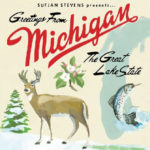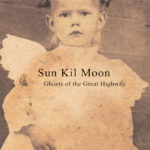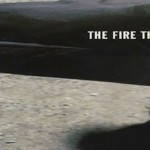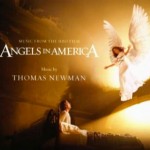Tag: Decade: 2000s
-

The New American Old West: Bruno Dumont’s Twentynine Palms
This essay was originally published at Senses of Cinema.
-

Fahrenheit 9/11
Like millions of others, I lined up this weekend to see Fahrenheit 9/11.
-

Tombigbee
If you’re too hip to like Tori, do me a favor and tell me what you think of this song. It’s a nice change of pace for her. No acoustic piano. A bit of distortion. Borderline lo-fi.
-

Dogville (2003)
There’s little sense in writing about Dogville without discussing its final sequence, and there’s little sense in watching Dogville if you know how it ends.
-
Little Children
So many of Perrotta’s observations of suburban life are so spot-on — I especially like the way that his lead characters absolutely adore their children while still resenting somewhat the life-changes they’ve caused — but the narrative voice never quite transcends the banality of the lives it is documenting. Maybe that’s the point. I doubt it.
-

Holland
It’s a heckuva song from Greetings from Michigan. I’ve added it and Stevens’ latest, Seven Swans, to my Amazon Wish List. Can anyone make a strong case for one album being better than the other? Any other Sufjan fans?
-

Cucurrucucu Paloma
I’ve been meaning to post this one for some time now. I’m not sure how well “Cucurrucucu Paloma” will work for those of you who haven’t seen Almodovar’s Talk to Her, but I had to buy the soundtrack for this song alone. I just can’t imagine being able to sing like Caetano Veloso. I’d never talk again.
-

Glenn Tipton
I’m pretty sure that this will be the last time I post a Song of the Moment that is named for one of Judas Priest’s guitarists. This song is what the inside of my head sounds like these days.
-

Chain
“Chain” by The Fire Theft. Why? Because the world needs a good emo waltz, that’s why.
-

Quartet
My wife surprised me yesterday afternoon with the Angels in America soundtrack. “Quartet” accompanies the scene that holds the rare honor of having made me cry two nights in a row. What can I say? Art is my refuge from a life of hardened cynicism. I can only imagine what condition I’ll be in on Sunday night when Louis delivers the Kaddish.
-

Big Dipper
“Big Dipper” is one more track from a mix CD that I received recently. I’ve never been a big fan of Cracker, but this song really works for me. I love the spare arrangement, especially the acoustic piano and steel guitar, but mostly I like this song because of the lyrics and because of David Lowery’s delivery of them.
-

Wayfaring Stranger
“16 Horsepower is a Gothic country-rock quartet from Denver, but their version of “Wayfaring Stranger” feels so fated, so instinctual, it spreads the South all over the American map, a dusting of damnation on wherever you might be as you listen.” — Greil Marcus
-

Are You Awake?
“Are You Awake?” by Kevin Shields is almost literally a song of the moment. At 1 minute, 35 seconds, it’s my shortest selection yet. I grabbed it from the Lost in Translation soundtrack, which I’ve been listening to all day at work. There’s something beautifully hypnotic about it.
-

The Gloaming
Radiohead broke with routine on Monday night by opening with “The Gloaming.” Like so much of the material from Hail to the Thief, it played better live than on the album. I especially like Colin Greenwood’s new walking bassline.
-

Mary
I just discovered that Supergrass will be opening for Radiohead Monday night. Very nice! I know that this opinion is terribly unhip, but I’ll say it anyway: More bands need keyboard players, and more songs need keyboard riffs like the one in “Mary.”
-

Lost in Translation (2003)
I really enjoyed Lost in Translation — enjoyed it as much as any film I’ve seen this year. As I watched Lost in Translation, I kept thinking of two other films, and it suffered for the (admittedly unfair) comparison.
-

Blinded by the Stars
If there were any justice in this world, Joe Pernice would be on the cover of Rolling Stone and John Mayer would be cleaning Jan Wenner’s pool.
-

Exit Music (For a Film)
Brad Mehldau is such a ridiculously talented pianist, composer, and arranger. His cover of Radiohead’s “Exit Music (For a Film)” isn’t particularly representative of his work, which is often more improvisatory and freeform (check out his Elegiac Cycle album), but it seemed a timely choice. Mehldau’s also been known to cover Neil Young, Nick Drake, […]
-

There There
Yeah, so like everyone else of my general demographic, I’m listening to the new Radiohead. I mean, it’s, like, required, right? So far, “There There” is my favorite track. Especially at high volumes.
-

Bomb the World
In ’94, Michael Franti formed Spearhead, one hell of a roots-based band, and has remained politically engaged. “Bomb the World” is his response to recent events.
-
Beau Travail (2000)
Whereas post-colonial critics have, in turn, criticized/praised Melville for his appropriation of racist stereotypes (or his subversion of those stereotypes, depending on which side of the debate each critic stands), Denis situates Melville’s moral dilemma in an explicitly post-colonial situation, complicating further the relationships between European and African, Christian and Muslim, and calling into question the political value and motivations underlying those relationships.
-

Adaptation (2002)
The problems of irony, particularly when of the postmodern bent, are on mind-numbing display in Adaptation, a film that collapses under its own self-referential weight so many times that, at some point — and I think it was right about the time that Meryl Streep started humping Chris Cooper — I stopped watching the film and began waiting for it to end.
-

Time Out (2001)
What separates Time Out (2001) from the recent spate of “disillusioned upper-middle-class white guy has a breakdown” movies is writer/director Laurent Cantet’s interest in the specific economic forces that lead — some would say inevitably — to such discontent.
-

Already Dead
Further (anecdotal) evidence that the record companies are pointing their fingers in the wrong direction: Sea Change is the first Beck album I have purchased, and I never would have done so had I not first listened to it via a file-sharing service. (By the way, Tom Petty also has a beef or two with […]
-

Frida (2002)
Julie Taymor’s Frida is a better-than-average 2-hour biopic, evidencing many of the typical strengths and weaknesses of the genre — a fascinating life told too quickly that borders, uncomfortably at times, on hagiography.
-

Punch-Drunk Love
I assumed that I would witness something special in a dramatic performance from Adam Sandler, which I did, but I wasn’t expecting such precise and economical filmmaking.
-

What Time Is It There? (2001)
All three characters in What Time is It There? represent Tarkovsky’s ideal — those who are “outwardly static, but inwardly charged with energy by an overriding passion” — and that passion alone is reason enough to watch.
-

Thinking About Tomorrow
I just spent the last hour in nirvana, listening to Beth Orton’s new album, Daybreaker. Soooooo good. 51 minutes of music without a single weak spot.
-

The Man Who Wasn’t There (2001)
The problem with The Man is that the Coens have invested a character with genuine pathos, but seem to have done so only in the interest of later undercutting it with their typical brand of cynical Nihilism.